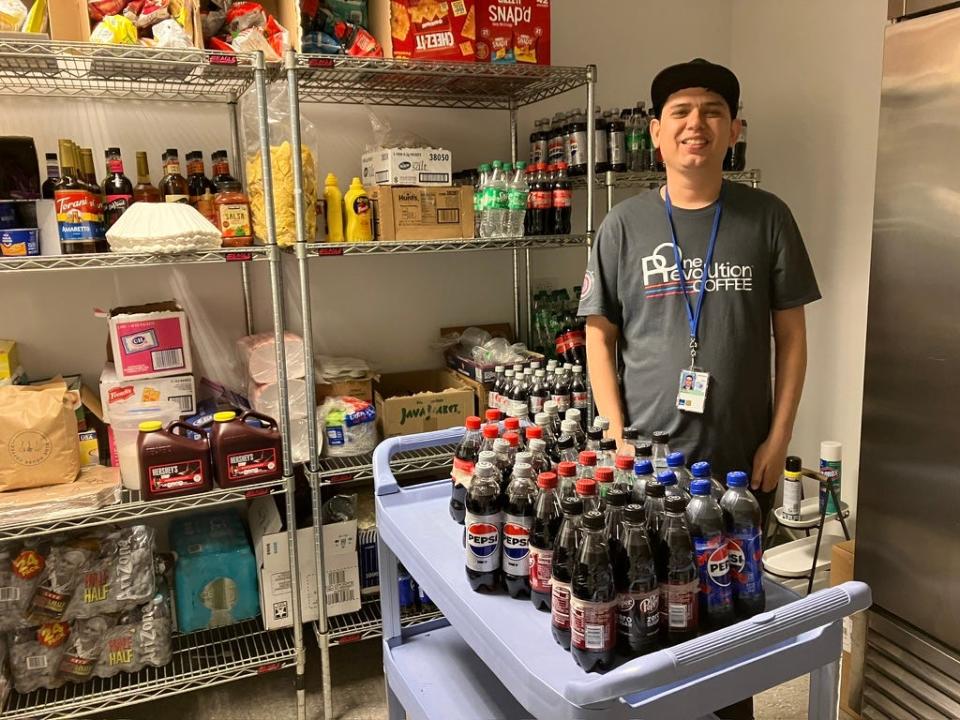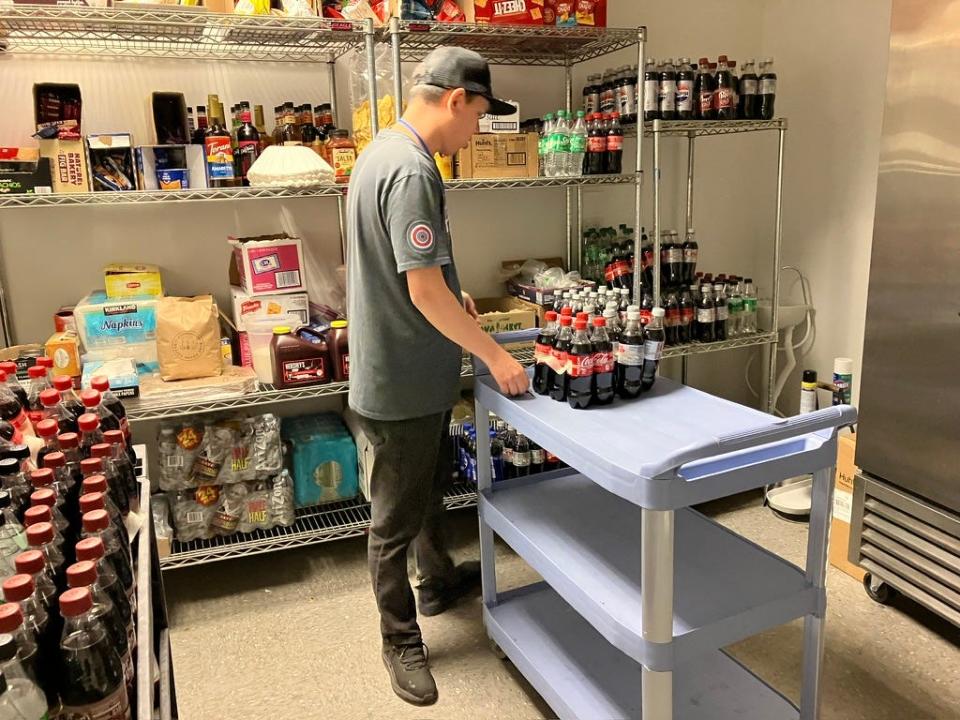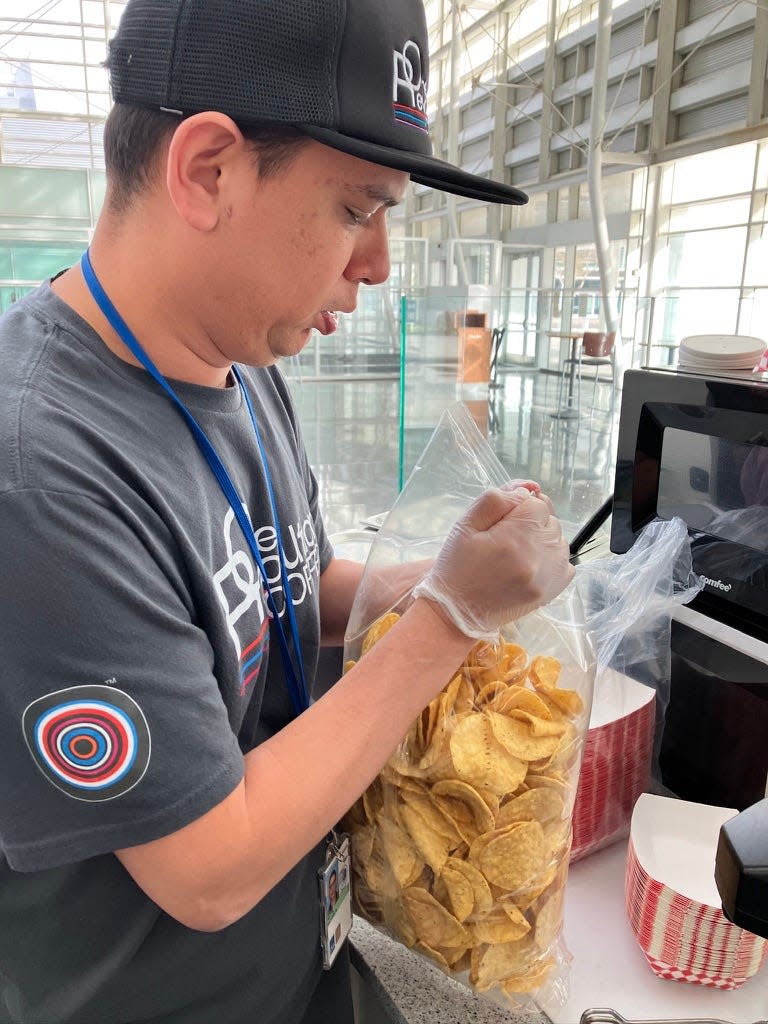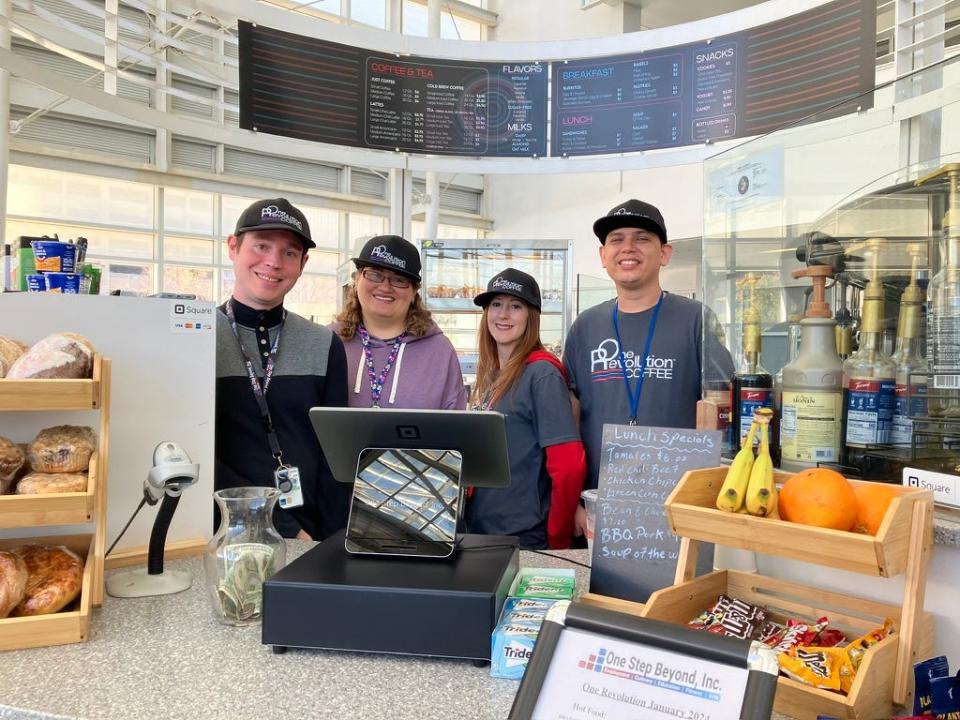'Mike time': A Phoenix courthouse coffee shop gives workers more than a regular paycheck
Mike Watts grabbed a trolley and pushed it with purpose across the polished floor.
He was headed for the storage room, a dark, windowless space full of coffee cups and bulk-bought sodas, tucked inside the vast atrium of the Sandra Day O’Connor federal courthouse in downtown Phoenix.
The drink fridge needed filling, but Watts wasn’t exactly unhappy to take on the task. Visiting the storage room is his second-favorite task.
“It’s like, my time, but it’s work time,” Watts explained, as he unlocked the door. “It’s my time to calm or to think.”
“Mike time,” he added, with a laugh.
It’s a chance to take a breath, which Watts occasionally needs amid the hustle and bustle of One Revolution Coffee.
The compact, circular kiosk inside the downtown Phoenix courthouse has its moments. It serves U.S. marshals hungry for potato chips, judges in need of a sugar fix and prospective jurors searching for lunch. On Fridays, the lobby fills with new Americans and their families, celebrating naturalization ceremonies.
On this particular morning, a Thursday, business was slow.
Watts had taken advantage of the lull. He had prepared hot dogs, both regular and spicy, and wrapped them in neat foil packages, and doled out servings of macaroni and cheese. He had filled cardboard boats with tortilla chips and placed them in the warmer, ready to be transformed into nachos when — if — the lunch rush commenced.
Then he surveyed the coffee shop, looking for something to do. And that's how he wound up stocking sodas.
Watts, who has a mild intellectual disability, schizo-affective disorder, and other health conditions, has worked hard to get where he is today.

He proved himself for years in a culinary program, passed a test to earn his food handlers certificate and sacrificed a beloved hobby. For the chance to work — something most take for granted — he had to get others to believe in him, and he had to believe in himself.
“It’s a real accomplishment,” he said.
"Mike time" over, he pushed the trolley back to the kiosk and parked it next to the drink fridge.
He began to restock, careful to place the warm sodas in the back and bring the cold ones to the front. It’s a standard system of stock rotation, known widely as FIFO: First In, First Out.
Watts knows the acronym. But he remembers it a different way.
“This is how I think about it,” he said, straightening up from the fridge. “Say if I was a customer. How would I feel like if I had the soda? Would I want it cold or would I want it warm?”
He took a beat before offering an answer.
“Nobody wants a warm soda. You know? You gotta put your mind in the customer's shoes.”
He tapped his temples.
“You gotta be the customer sometimes.”
Health: Arizona State Hospital opens up about how it cares for seriously mentally ill
Finding an opportunity at One Revolution Coffee
Watts is always thinking about the customer.
He knows his strengths, and one of them is customer service. It doesn’t matter if the person in front of him is a judge, or a person on probation, or, in his most memorable serving gig so far, the bride and groom at a wedding.
Shooting the breeze with customers, joking around, going the extra mile — it’s what he does. It’s what he’s best at. It’s his favorite part of the job.
One Revolution Coffee opened quietly a year ago. It is operated by One Step Beyond, Inc., an Arizona nonprofit that offers recreational and employment programs for people with intellectual disabilities.
The coffee shop is part of a major shift for the organization, away from the disability employment programs and wages of the past, and — they hope — toward those of the future.
Watts, who is 31, has participated in the One Step Beyond program for a decade. In June last year, he started working at One Revolution, one of six participants tapped for the job.
Watts works two shifts a week, usually alongside one other employee who has an intellectual disability, as well as job coach Maria Holguin, and Jayson Lolling, the store manager.

Lolling, a veteran barista, used to have his own coffee shop. But like so many businesses, it faltered and then fell when COVID-19 hit.
As he searched for his next move, the opportunity to work with One Step Beyond came up. Lolling’s old cafe was in the University of Arizona medical building downtown, serving coffee to students and staff.
“This is very, very similar to what I did before,” Lolling said, as he watched Watts and Holguin set up. “So it worked out perfect.”
So far, it’s going smoothly. The biggest problem the One Revolution crew has encountered has been with the building itself, a steel-and-glass structure that is as architecturally beautiful as it is impractical in the Phoenix summers.
The sun beats in relentlessly, transforming the foyer into a giant greenhouse. An enclosed hut keeps the security staff cool, but One Revolution is out in the open. At the peak of the heat, they had to temporarily move into the storage room.
Lolling hasn’t worked with people with intellectual disabilities in the past. But, he said, it’s not foreign territory to him.
He has Tourette Syndrome and ADHD, and was in special education classes as a child, learning alongside kids with all kinds of disabilities.
After school, he got a degree in accounting, but quickly realized he didn’t want a desk job. He needed to be around people, an itch that was scratched by his part-time job at Starbucks.
“I just love the coffee world,” he said.
He went on to carve out a 20-year career in hospitality. Then he landed at One Revolution.
“You know, I was given all these opportunities that a lot of people haven't,” Lolling said. “So that's why I absolutely love doing this. To be able to provide the same opportunities I had."
He learned to 'focus on the positive'
Before Watts started working at One Revolution, he thought he might have a hard time adjusting to some of the demands of the job.
It took a while to figure out all the buttons on the point-of-service tablet, but now he can find everything. He is learning the drinks as he goes.
But overall, Watts said: “I caught on quick.”
His bosses agree. In a recent performance review, he had nothing to improve on. And if his ability to build rapport with the broad slice of society that passes through the courthouse doors is anything to go by, he has found his vocation.
Most of the customers at One Revolution are very kind, Watts said. If someone is rude to him, which doesn’t happen very often, he reminds himself they’re probably having a bad day.
It’s a generous mindset. It’s also one Watts worked hard to adopt.
Asked to describe his disabilities, he reached first for his past.
“I had it kind of rough growing up,” Watts said. “Me and my brother, our biological mother didn't really take good care of us like a mother should.”

He had a hard time dealing with his emotions, Watts said. He blamed his biological mother for his struggles. He held a lot of anger toward her, which he took out on other people.
Eventually, he decided to let it go. His adoptive mom and dad helped. He and his brother wouldn’t be here without them, Watts said. Therapy helped too. A lot of therapy.
And so did the couple he currently lives with in an adult developmental home, a kind of family foster care for intellectually disabled adults.
When he moved in with them about three years ago, Watts said, he sensed he was in a good situation. He wanted to make it work.
“I was like, OK. I have to leave everything behind,” he said. “Just focus on the positive. Focus on doing good.”
Most days, he succeeds.
“There’s some days I think about my past. My past stuff,” he said. “It haunts me to think about.”
“But I look back and like, OK. That’s OK. Because I’m doing better now.”
Giving up hockey for a steady job
Before he started working at One Revolution, pretty much all Watts talked about was hockey.
For five years, he played on the One Step Coyotes, which was established in 2016 as the first adaptive ice hockey team in Arizona. For Watts, a sports fanatic, hockey wasn’t just another activity. He loved it. He lived it.
Mike Homco, the executive director of One Step Beyond, said that for years every conversation he had with Watts revolved around hockey in one way or another.
The team practices on Thursdays. Then Watts was offered the Thursday shift at the coffee shop.
It was a huge decision. But he knew his priorities.
“I wanted the job opportunity,” he said. “And it came and I’m not going to turn it down.”
He misses hockey sometimes, but not too often.
“If I wasn't happy about my job, I probably, I would miss my hockey,” he said. “But I'm going to tell you the truth. I'm really happy about my job.”
Holguin, the job coach at One Revolution, has known Watts a while.
She used to be a full-time driver for One Step Beyond, which she still does when she’s not coaching employees at the coffee shop. Watts was among the participants on her route.
She described him as “serious about his job," the kind of employee who comes in and knows what to do.
“He'll look around and check his Pepsi or soda,” she said. “See what needs to be stocked.”
“He loves stocking,” added Bianca Benavides, who works with Watts on Thursdays.
Benavides started attending One Step Beyond after moving to Arizona from Texas in 2019. She likes working at One Revolution, where she often runs the cash register, armed with a floral lanyard and a dry sense of humor. She works two shifts a week, and wants to pick up another.
She had a stroke as a child, which weakened her left side and caused some memory issues. She cannot use her left hand, which she figured was a dealbreaker for some employers. But she manages fine at the kiosk, methodically switching her right hand between scanning items and the cashier’s tablet.
Her customer service skills have improved, she said. “I was a bit shy in the beginning. I'm better at it now. Saying ‘Good morning. How's your day?’ Things like that.”
Benavides used to work at a bookstore, also run by One Step Beyond, that was next to a library in Avondale. But there wasn’t much to do there, and she felt her skills going to waste.
“I knew I could handle some more challenging stuff,” she said. “It's just I needed to wait for the right opportunity here.”
As Watts finished restocking the sodas, a couple of U.S. marshals dropped by. One of them bought lunch. The other had, traitorously, purchased a sandwich from Jimmy John’s. But after some sweet-talking from Watts, he grabbed a Pepsi.
“I told him he needed to get a drink,” Watts said, as Benavides scanned the drink.
“He’s a good salesman,” the marshal said ruefully.
He’s friends with the marshals, Watts later explained. The security staff too.
“If he gets in trouble with security, he might actually talk himself out of it,” Benavides joked.
As customers came and went, Watts went above and beyond in every interaction.
“Here’s your delicious, nutritious soup,” he told one woman as he handed her a steaming cup.
When another customer confirmed she wanted salsa with her burrito, Watts scanned the fridge for the best one.
“Here you go, ma’am,” he said, reaching over the counter with a ramekin. “A big full one for you.”
His diligence extended to food preparation. As he finished assembling a hot dog, Watts noticed the sausage protruding from the foil, and showed it to Maria.
“Correct your ends,” Maria said. “It’s all you gotta do.”
“I got it, Maria,” Watts said.
He unfolded and refolded the foil, making sure to encase the hot dog. Then he put it in the warmer, careful not to brush up against the heat elements.
How to use the warmer is among several food safety protocols Watts has had to memorize. He demonstrated how to safely carry a sharp knife across the tiny kiosk, and explained best practice with gloves and the importance of washing hands after using the bathroom.
And, crucially, he knows to never overfill the sink.
“This person,” Watts said, grinning as he pointed at Holguin, “she filled the sink super high and overflowed it.”
“I turned my back for a second,” Holguin admitted, taking the jibe in her stride. “I forgot, and it started bubbling everywhere on the floor.”
A push for change
When Watts said One Revolution was his first job, he added a caveat.
“A real job,” he said. “I had culinary, but that wasn’t a job job. This is my first job.”
Before starting at the coffee shop, Watts was part of the culinary catering program at One Step Beyond. It is one of a wide range of programs offered by the organization including art, dance, fitness, music and pre-vocational training for those interested in entering the workforce. (Attendees are typically enrolled with the Division of Developmental Disabilities, which reimburses OSBI for the services it provides, though they also take private pay.)
The catering program acts as both group-supported employment — in which people with disabilities are employed in a small group under supervision — and job training, where participants learn what to expect in a community workplace. (There is also a non-employment track of the culinary program, in which participants learn cooking and kitchen skills they can use at home.)
The One Step Beyond catering crew cooks for events ranging from parties to weddings to functions at the state Capitol. They make lunches for their fellow One Step Beyond participants. They also make a variety of products — muffins, burritos, granola bars and more — that are sold at One Revolution.
Many of them are paid below the minimum wage for this work. Since the federal minimum wage was introduced in 1938, it has been legal for authorized employers to pay below minimum wage rates to workers with disabilities.
Employers must be issued a certificate by the U.S. Department of Labor and adhere to certain guidelines, such as paying workers a commensurate rate depending on their productivity and conducting regular time studies to see if their wages should be increased. Typically, workers earning subminimum wage are working in group-supported employment.
At One Revolution, Watts earns $17.20 an hour, the minimum wage for federally contracted employees. He said he is happy with his current paycheck, but earning less in the culinary program made him feel frustrated.
“Just a little frustrated because I wanted more money,” he said. “I wanted to do things.”
One Step Beyond is among 23 organizations in Arizona authorized to employ people under subminimum wage certificates. It employs around 96 people overall, both through the catering program and through partnerships with community businesses, such as Barros Pizza. (Of the 38 people in the One Step Beyond catering program, 14 are at or above minimum wage and the others within $3-4 of it.)
Ideally, partner businesses hire participants outright and One Step Beyond provides the job coach. If the business isn’t up for that, they negotiate a service agreement where the business pays One Step Beyond a flat rate and they in turn pay the workers what they are owed.
“That’s how we started our employment program,” said Mike Homco, the executive director of One Step Beyond. “And we’re happy to say we are going away from it.”
“We are pushing very, very hard to get everyone employed in the community.”
President Joe Biden promised to end subminimum wages for disabled workers in 2020, but change hasn’t yet come at a federal level. Several states have eliminated subminimum wage anyway — including California, where One Step Beyond operates two centers — but Arizona is not one of them.
In a 2023 white paper, the Arizona chapter of APSE, an association advocating for the right to work for all people with disabilities, called for subminimum wages to be eliminated in Arizona.
These contracts “perpetuate the stereotype that people with disabilities are not capable of performing meaningful work and can lead to long-term economic insecurity for these workers with disabilities,” APSE said.
The push for people with disabilities to have the same employment rights as their non-disabled peers is not so much a new shift as an agonizingly slow one.
No one knows that better than Watts and Benavides, who both waited a long time to get the job they have now.
Homco is also acutely aware. He said he feels conflicted about employing people on subminimum wage contracts, but finding businesses willing to hire adults with intellectual disabilities into minimum wage jobs is difficult.
“I don’t like it, because they’re worth so much more,” he said. “But sometimes it’s the only way to get them a job immediately.”
It’s a foot in the door, he said, a way to get someone into a position and a paycheck if a minimum-wage job is not available.
“The ultimate objective is to attain minimum wage or higher employment for individuals with the support of a job coach," Homco said.
It has happened. Homco gave the example of Peoria Discount Grocery, which first partnered with One Step Beyond on a subminimum wage group-supported employment program, and has gone on to hire seven people into cashier and stocker jobs.
But it doesn’t always happen. Other contracts have not transformed into minimum wage work.
Things have improved over his 20 years at One Step Beyond, Homco said, but there is still a lot of skepticism and stigma. He said his staff spends a lot of time pounding the pavement, trying to build relationships with local businesses and convince them to give workers with intellectual disabilities a chance.
They talk about the “heartstrings” side of it, Homco said — attempt to convey the self-worth that radiates from an adult who has just earned a first paycheck — but also about the benefits to the employer. He cites punctuality and job performance as areas in which One Step Beyond participants excel.
And over the past six months, he has been spreading the word to community partners: Change is coming.
As contracts come up for renewal, businesses will be given three options: One, continue to hire groups of workers through One Step Beyond and pay them the minimum wage or higher. Two, hire One Step Beyond participants into minimum wage jobs. Three, no contract.
In the One Step Beyond catering program, funding the wage increase will involve scaling up operations, Homco said.
As the organization faces this shift, Homco hopes to see an end to subminimum wage certificates in Arizona. “I hope it does happen,” he said. “So it goes away, and everyone’s forced to address it.”
In the wake of the pandemic, he said, he hears people talking about needing workers all the time.
He has a message for them: “We’ve got a workforce ready to go.”
The lunch rush
The elevator dinged. A crowd spilled out of the silver doors, each sporting a large numbered sticker on their chest. The jury pool, hungry for lunch.
The orders piled up quickly, put through by Benavides. Lolling worked the coffee machine while Watts and Holguin manned the microwaves, heating up a steady stream of burritos and the occasional tamale.
The different fillings were easy enough to tell apart in the fridge, wrapped and labeled with a neat One Step Beyond logo, but nigh on impossible once stripped of packaging.
“This is an egg and cheese right?”
“No, we just served the egg and cheese, this is the meat.”
A chorus of “right behind you” and “excuse me” and “that egg and cheese still coming?” rang through the tiny kiosk as its four employees did their best not to get in each other’s way.
Watts and Holguin grabbed burritos and hit buttons and transferred the heated food into cardboard boats, making sure to get it to the right person complete with salsa and — if Watts had anything to do with it — a compliment.
In an idle moment, both microwave plates spinning, they stopped to bump elbows, the food safety version of a high five.
“Maybe when we’re done serving food we can fist bump,” Watts said.

Finally, the line dwindled, and then disappeared. The final waiting customer got a full salsa and a “nice sweater!” along with his tamale. Calm settled over the kiosk.
“Wow, that went fast!” Watts said.
“It happens,” Lolling said. “It’s like, nothing, nothing, nothing, and then it’s like, bam!”
“Sometimes it’s nothing and nothing and then we’re standing here all day,” Benavides said.
Lolling laughed. “Yeah, exactly.”
The team cleaned up, got ready for the next rush. And then it was time to break for lunch. As he selected a hot dog — his meal of choice at One Revolution — Watts radiated a happy energy, invigorated by the experience of a job well done.
“I think the coffee shop is right for me,” he said, “because I've done a lot better than I have ever done.”
As much as he loves his job, Watts still has moments where he gets frustrated. Over the years, he has learned how to turn his days around.
When he feels himself growing upset, or like there’s too much going on in his head, he excuses himself to the bathroom. He looks in the mirror.
And he says: “Look, you're gonna have a good day. You're gonna have a good day. You're not gonna let this bother you. You're gonna keep moving. You're gonna do what you gotta do.”
Then he washes his hands, and goes searching for his next task.
Lane Sainty is a storytelling reporter at The Arizona Republic and azcentral.com. She writes about interesting people, places and events across the 48th state. Reach her at lane.sainty@arizonarepublic.com.
You can support great storytelling in Arizona by subscribing to azcentral today.
This article originally appeared on Arizona Republic: One Revolution Coffee in Phoenix helps intellectually disabled

